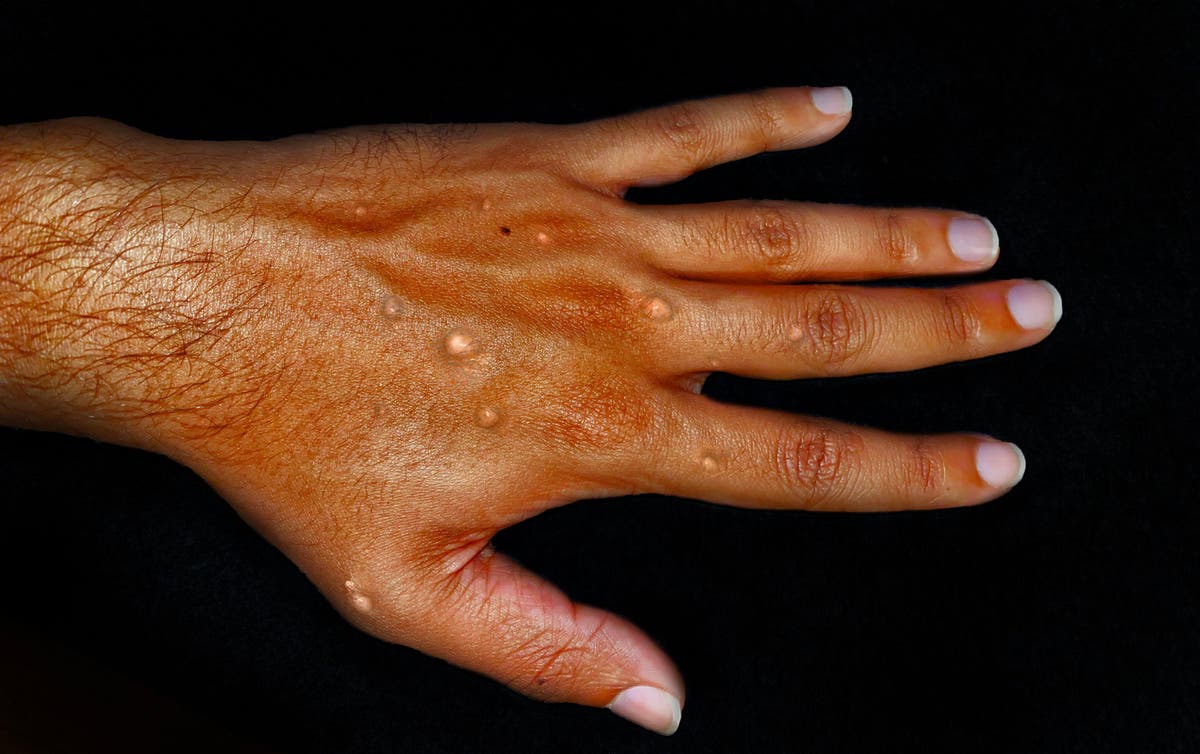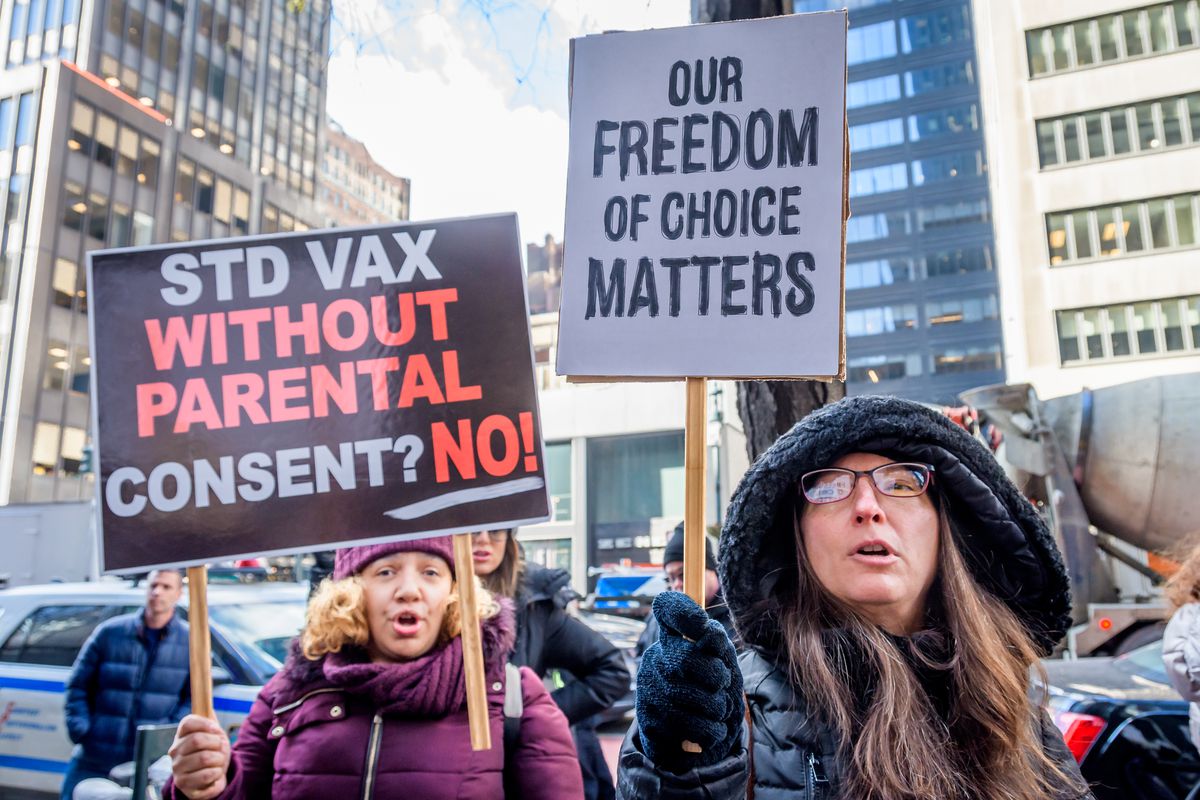The Human papillomavirus (HPV) is the most common sexually transmitted disease. Over 200 strains of HPV have been identified with 100 of these that may infect humans. The majority of these HPV infections are benign, but there are 15 that have been identified as high-risk HPV associated with the risk of developing cancer. While the majority of people will clear HPV infections in less than two years, it is those patients with persistent infections that have a risk of developing cancer. As a professor in the Department of Obstetrics, Gynecology and Reproductive Sciences at McGovern Medical School at UTHealth Houston, I’ve spent more than 20 years researching women’s health, and more pointedly, looking for a way to eliminate persistent high-risk HPV infections that may cause cancer. Read on to find out more—and to ensure your health and the health of others, don’t miss these Sure Signs You’ve Already Had COVID.
Shutterstock
HPV affects more than 80-percent of sexually active adults at least once in their lifetimes. HPV infections can be transmitted through intimate direct skin-to-skin contact. Yes, use of barrier protection during sexual activity helps reduce the rate of transmission but HPV transmission can still occur without the exchange of bodily fluids. Like most sexually transmitted diseases (STDs), reinfections are common whenever someone is exposed to multiple new partners over a lifetime. Unlike other STDs, currently there is not testing readily available for men. Women are not routinely tested for HPV until after the age of 25 unless they have an abnormal PAP smear before the age of 25. So the challenge is most adults are unaware that they have high-risk HPV until it causes a problem. There are two primary kinds of HPV infection: low-risk and high-risk. Low-risk HPV is associated with benign lesions or warts. Persistent high-risk HPV infects cellular DNA and increases the risk of developing six HPV-associated cancers, the two most common being cervical cancer and head and neck cancer. Persistent high-risk HPV infections can last for years without any issues until triggered by another insult such as poor nutrition, physiological or psychological stress, or weakening of immune function. 6254a4d1642c605c54bf1cab17d50f1e
 Shutterstock
Shutterstock
Low-risk HPV infections are associated with genital warts and can take on the appearance of flat lesions, cauliflower, or raised bumps that present anywhere in genital area and do not typically cause pain, but may itch. While uncomfortable and disfiguring, low-risk HPV infections, fortunately, are not associated with cancer. Low-risk HPV infections are common and not cause for panic, but they are a sign to go to the doctor and get checked out. The doctor will perform tests made specifically to detect the presence of HPV and provide treatment based on the diagnosis. Conversely, high-risk HPV infections are not associated with any physical symptoms, which emphasizes the importance of regular screening including HPV DNA testing with cytopathology (PAP Smear). This will allow for early detection and intervention for any abnormal cellular changes. Often when women are diagnosed high risk HPV present have no signs of cell damage that could lead to cancer yet all we can do is “watchful waiting” screening. This scenario is one of the many reasons that prompted the initiation of our research to find an effective intervention to eliminate persistent HPV infections.
 Shutterstock
Shutterstock
Options for the management of HPV infections have traditionally been local treatment of the affected area. This may include procedures such as cold knife excision (CONE) or loop electrosurgical excision procedure (LEEP) that can remove the affected tissue but does not eliminate the HPV or risk of future issues. Recently, our research team from McGovern Medical School at UTHealth Houston published the first systemic approach for management of persistent high risk HPV infections. The results of this randomized, double-blind, placebo-controlled Phase II study supported by a grant from the National Institutes of Health that focused on women with a history of persistent high-risk HPV for more than two years. The study, published in Frontiers in Oncology, included 22 patients in the intervention arm of the study, who received AHCC supplementation for six months followed by six months of a placebo, and 19 participants in the placebo arm of the study, who received a placebo for the full 12 months of the study. The results revealed that in 63.6% (14 out of 22 participants), AHCC supplementation cleared the high-risk HPV infection with no adverse side effects. The Phase II study results are consistent with the previous findings from two pilot studies evaluating AHCC supplementation in women with persistent HPV infections.
 iStock
iStock
Different that other mushroom extracts, AHCC is an extract derived from the mycelia (roots) of lentinula edodes mushrooms that contains primarily alpha-glucans and polysaccharides that modulate the immune response to regain its ability to clear persistent HPV infection. As with all supplements, talk to your clinician before you take AHCC to be sure it’s a good choice for you.
Most people who eat a healthy diet will get the appropriate amounts of vitamins and nutrients to naturally support the immune system. However, supplementation with vitamin D, folate, omega3s, vitamin C, as well as probiotics to optimize the gastrointestinal tract microbiome, can help to strengthen the immune system even more. A quick blood test with your clinician can tell you whether you’re getting appropriate nutrients, if you need to make some changes to your diet or even consider a supplement for any of these or other critical vitamins and nutrients. Considering how common HPV infections are amongst sexually active adults, a healthy immune system may not keep you from becoming infected, but it can help you to mount a defense against it.
 Shutterstock
Shutterstock
HPV infections are difficult to avoid. Most sexually active individuals will contract HPV at some point in their lives. Awareness and education about HPV infections and the potential long-term risk is important for all that are going to be or have been sexually active. Although most cases will clear naturally and without intervention, you can take basic steps to protect yourself against the effects of high-risk infections. Getting vaccinated, maintaining a healthy lifestyle, attending annual wellness appointments and screenings with your clinician, and asking your physician about taking AHCC to support your immune system in the face of an infection, could make all the difference in both your short- and long-term health.
Judith A. Smith, B.S., Pharm.D., BCOP, CPHQ, FCCP, FHOPA, FISOPP is a Professor & Director of Women’s Health Integrative Medicine Research Program UTHealth McGovern Medical School Houston, TX, USA.
Judith A. Smith
Judith A. Smith, B.S., Pharm.D., BCOP, CPHQ, FCCP, FHOPA, FISOPP is a Professor & Director of Women’s Health Integrative Medicine Research Program UTHealth McGovern Medical School Houston, TX, USA. Read more
Discovered on: 2022-07-21 12:00:59
Source: This Supplement May Decrease HPV-Related Cancers, According to New Study — …



